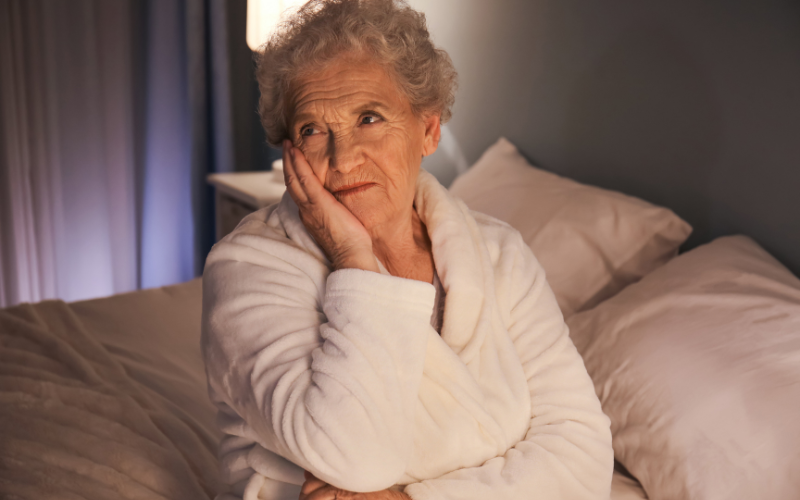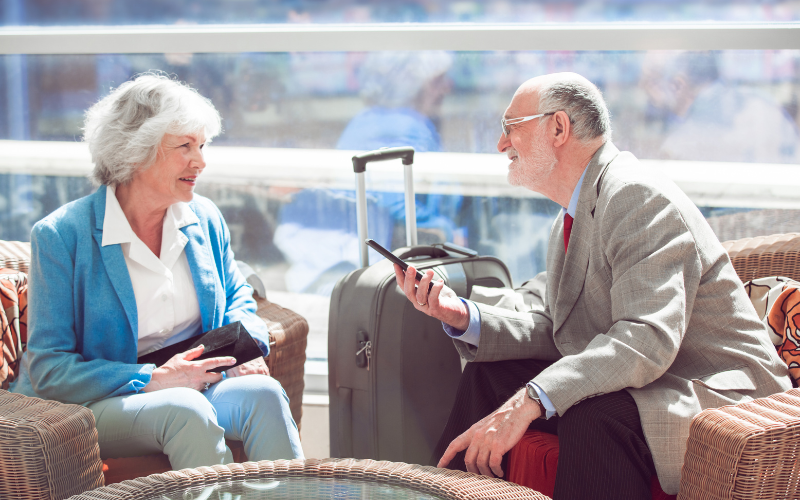
For many adult children, their parents once epitomized health and independence. However, as Mom and Dad age, their mental and physical capabilities inevitably decline. Declining physical and cognitive abilities causes families to consider whether it is safe to leave their aging parents home alone.
Family caregivers must continually reassess their parents’ health and abilities to determine if they can be left alone for short periods. If not, the adult children’s flexibility and freedom become constrained, necessitating creative strategies to manage errands and other responsibilities.
What contributes to dependence?
Incontinence, memory loss, hearing and vision problems, and confusion are not normal aspects of aging. A decline in function is often due to treatable conditions. By visiting a geriatrician who specializes in the medical conditions of the elderly, seniors may be able to restore their ability to function independently.
Alzheimer’s disease, too, is not a normal part of aging. As a form of dementia, Alzheimer’s affects a senior’s memory, thinking, and behavior. When an elderly parent suffers from dementia, especially in the middle to late stages, the senior is likely to behave in uncharacteristic ways.
An aging parent may no longer be able to safely remain at home for long durations due to a decline in cognitive or physical health. As family caregivers, adult children have the responsibility to evaluate individual scenarios, ask questions, involve the parents and make the right decisions.
Answers to the following questions are helpful in guiding family caregivers in their decisions to leave elderly parents at home alone. Before choosing to leave aging parents alone, remember to regularly re-evaluate current scenarios, as seniors’ health and abilities change over the course of time.
Are your loved ones able to drive safely?
You must consider if your senior loved ones can still safely drive their car. If they have trouble keeping the car in the lane, stopping for red lights and stop signs, understanding what to do at intersections, or have gotten into recent accidents, it may be time to talk about whether they should keep driving.
If your loved ones can no longer drive safely, it is important for them to give up their driving privileges. You may have to keep an eye on them at first or take away their keys to make sure they do not try driving without you knowing. If your loved ones relied on themselves to handle errands and get to doctor appointments, you should make arrangements for transportation.
Can they safely prepare food?
Seniors must be able to prepare food for themselves to avoid malnutrition, but cooking can be dangerous for seniors with cognitive and physical limitations. If they are having trouble preparing their own food, they may cause an accident while cooking or avoid preparing and eating meals altogether.
Make sure your senior parents have the presence of mind to not forget that the stove or oven is on. They should also be able to competently use utensils like knives, so they do not hurt themselves. Check their food as well to make sure they are buying new food and not hanging on to or eating expired food. If your loved ones cannot safely cook, you can have a family member do the cooking for them or sign them up for a senior food delivery program.
Is the home safe?
The home can become a hazardous environment for seniors with physical or cognitive limitations. You must consider if your senior loved one’s home provides a safe enough living environment.
If your loved ones have limited mobility, consider putting non-skid flooring in the home and put handrails at all staircases. You can also add grab bars near the toilet and in the shower to reduce the risk of falling in the bathroom. If possible, relocate their bedroom to the first floor so they do not have to walk up and down the stairs often. Improving the lighting and removing possible trip hazards like rugs and cords can make walking through the home safer.
Installing an emergency alert system is a good idea for seniors with an illness or chronic condition. This allows them to immediately contact help in case of an emergency.
Do the parents recognize their surroundings?
Seniors who suffer from Alzheimer’s disease experience confusion about time and place. Once-familiar surroundings become unfamiliar to those affected by dementia. When aging parents live with Alzheimer’s disease, adult children may realize the inherent dangers in leaving them unattended at home.
Elderly individuals without a dementia diagnosis should be aware of their immediate environment, if they are to remain safely at home alone. It is important for them to know the location of doors and how to operate locks, in the event an emergency requires them to exit the building.
Are the parents prone to wandering?
Wandering is another symptom of dementia. Seniors who wander might have difficulty remembering their address and following directions. In worst case scenarios, the seniors will fail to find their way home. Elderly people getting lost is a cause for concern. Preserve their safety by not leaving them alone.
Can the parents identify emergencies?
Aging parents may be left alone if they are able to quickly recognize and respond to emergencies. Smoke from the kitchen and blaring burglar alarms should notify them of potential danger. The seniors should be able to physically reach the phone, call 911, and communicate the emergency.
However, when aging parents’ cognitive abilities are in decline, thinking and judgment skills are affected. The seniors may fail to exit the home in time, which can jeopardize their safety. Similarly, seniors with a lack of judgment may allow strangers into the home—but not emergency personnel.
Do the parents make reasonable decisions?
Dementia robs seniors of their ability to reason. Judgment is affected, and rash decisions are an inevitable outcome. For such seniors, being left alone allows them to become prey to financial scams, either over the phone or in-person. Caregivers in the home, however, prevent exploitation.
Are the parents in good physical health?
The elderly population has a high risk for falls, slips, and injuries. Accidents can result in infections, broken bones, and even death. Evaluate the parents’ abilities to be mobile and walk independently. If Mom or Dad has fallen once or more within a year, reconsider leaving them alone at home.
Can the seniors handle the ADLs?
Independently handling the activities of daily living (ADLs), such as bathing, dressing, toileting, and other personal hygiene activities, is necessary if seniors are to be safely left alone. Incontinence issues plague many seniors. When elderly individuals are left by themselves, alternative solutions should be in place so that they can reach the bathroom in time.
Evaluate the parents’ abilities to prepare meals on their own. If the parents are hungry, do they have the physical ability to cook a meal? The seniors should remember to turn off a hot stove to prevent a fire. Memory issues should be carefully considered for safety reasons.
Do the parents fear being alone?
When seniors are struck with fear at the thought of being alone, it is a sign that they are unable to handle unanticipated emergencies while the family caregiver is away. The parents may resort to clinginess or making frequent phone calls when the adult child is out of the home.
Senior Home Care from Assisting Hands

Family caregivers who assume their elderly parents may be safely left alone at home should pay closer attention to their loved ones’ desires. When permitting senior loved ones to remain alone is not an option, family members can get reliable support from home care agencies, like Assisting Hands Home Care.
Assisting Hands Home Care provides support for your senior loved ones with daily activities such as bathing, grooming, and toileting. If your parents tend to wander, our memory care experts gently guide them to safety. We also prepare meals, shop for groceries, and offer safe transportation for seniors.
Professional caregivers are the perfect solution for seniors who are alone and lonely. Our companion caregivers take an interactive approach, ensuring that those in our care enjoy pleasant company and stay mentally engaged. We play games, engage in conversation, and accompany them on walks.
When your loved one can no longer stay home alone, trust our licensed caregivers at Assisting Hands Home Care. Our staff will work with you and your loved ones to create a personalized care plan that meets their specific needs. We are committed to providing compassionate elder care to the senior community in Medinah, IL | Glendale Heights, IL | Itasca, IL | Bensenville, IL | Elmhurst, IL | Villa Park, IL | Addison, IL | Lombard, IL and the surrounding areas of DuPage County. Call us at (630) 526-6522 to schedule a free consult today.















